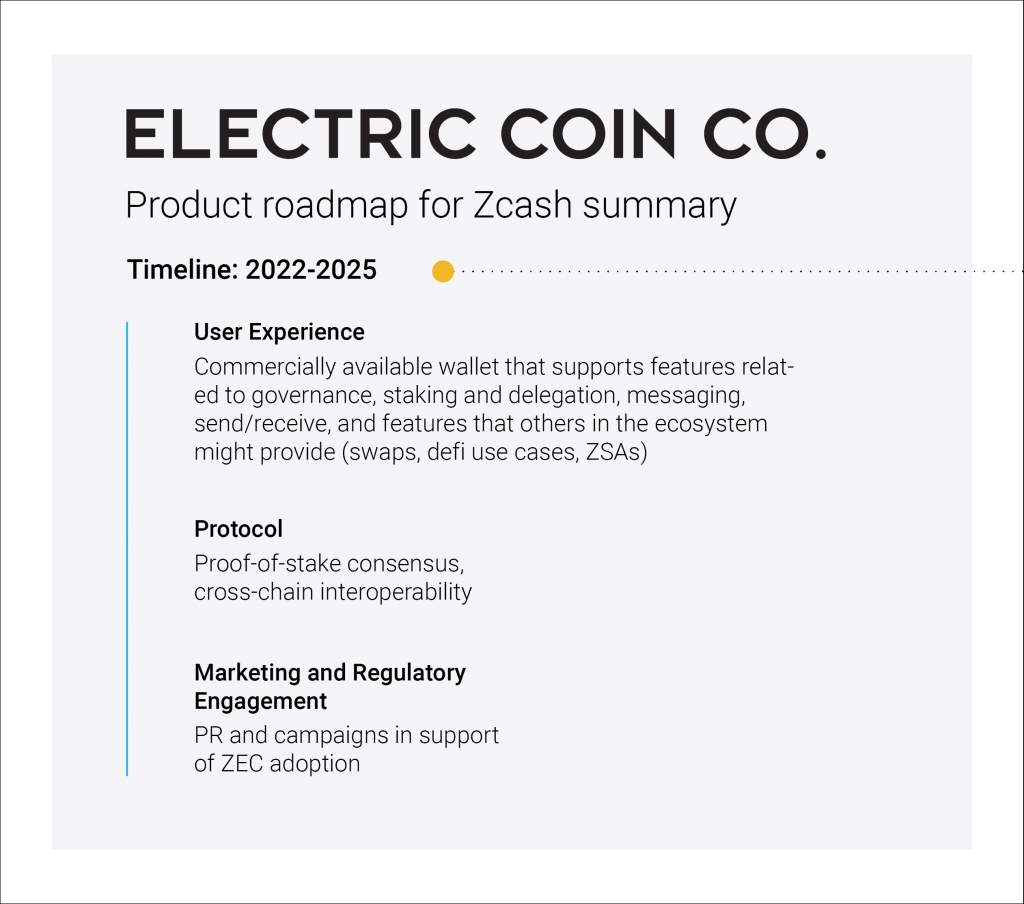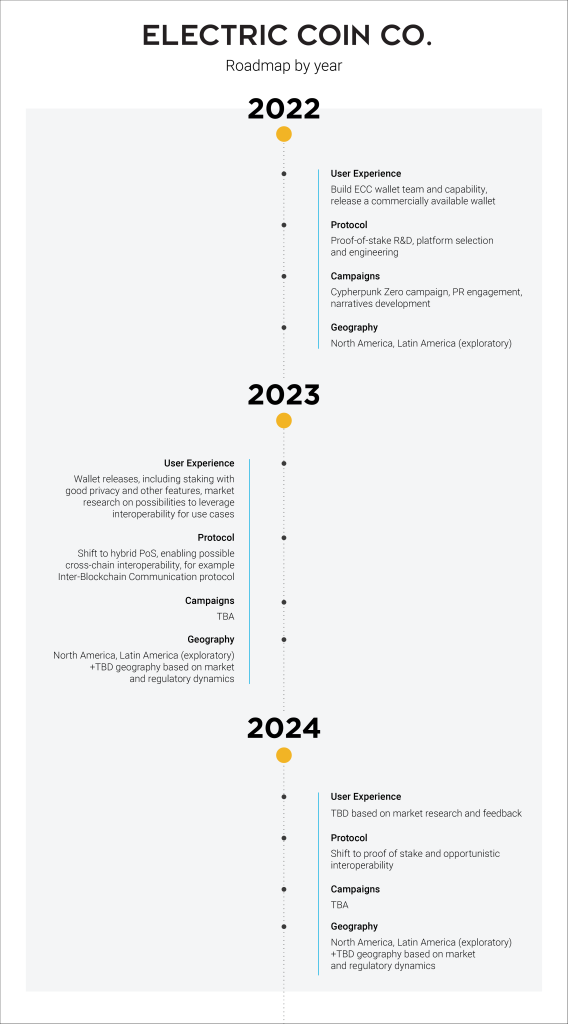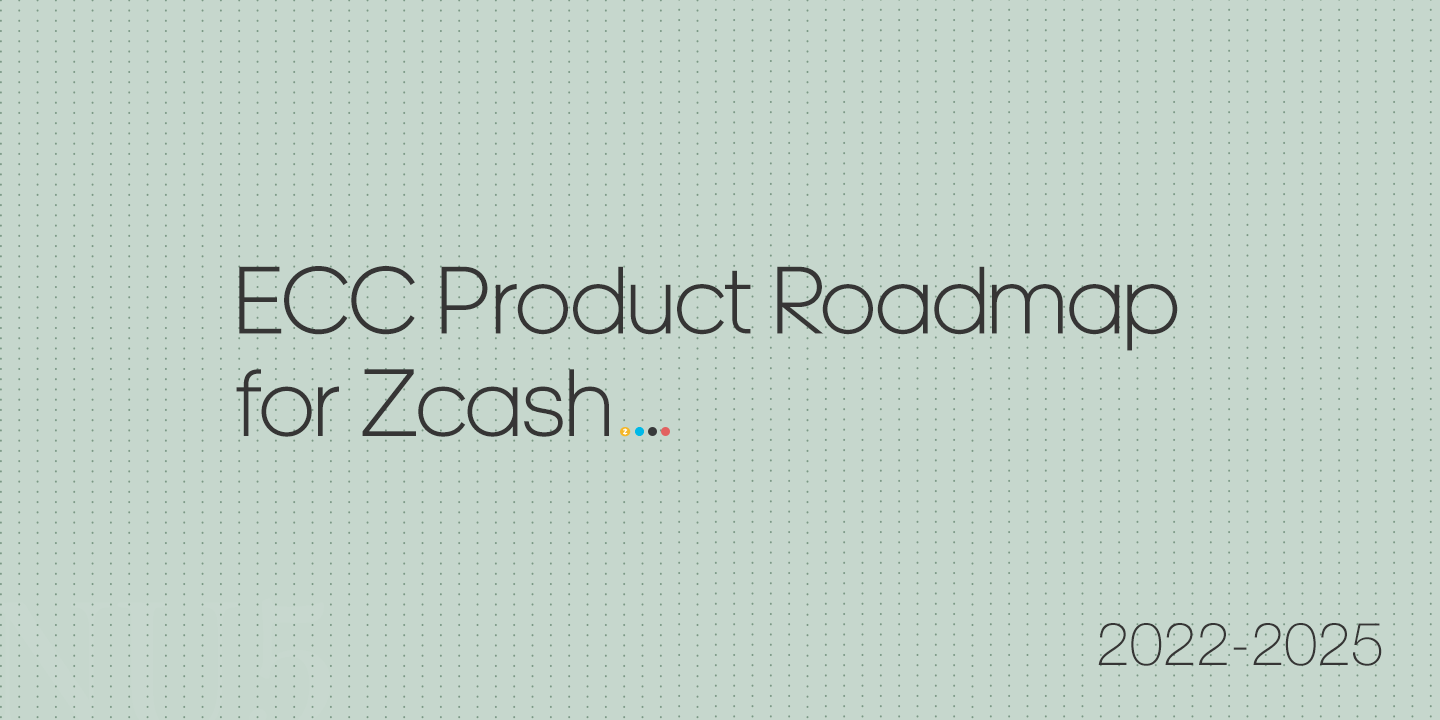Summary
In support of our strategy to deliver a world-class user experience for ZEC, ECC has been working through product roadmap planning — driven by the evolution of the internet, industry research, community sentiment and market opportunity. Specifically, our research has focused on commercial wallet models and user experience, Zcash Shielded Assets (ZSAs), proof of stake, and cross-chain interoperability.
Based on that work, it has become clear that the best way for ECC to contribute to the Zcash community over the next three years is to release an official ECC wallet on top of a highly interoperable Zcash protocol that leverages proof-of-stake consensus.

This blog provides context, our rationale for our decisions and a high-level three-year roadmap. Our vision is expansive, and our roadmap aggressive, but it is achievable and will require separate but integrated workstreams, with key decision points on the way, including feature prioritization, platform and tool selection, and go-to-market plans.
We fully expect others in the Zcash community to have a vision for and deliver on other community priorities, which may include support for ZSAs. For those interested in learning more about our research and thinking on ZSAs, and why we are not specifically prioritizing them at ECC at this time, please refer to our companion blog. Though our focused efforts will be in support of our roadmap, as detailed below, we fully support and embrace the work of other developers who are thoughtfully adding capabilities to Zcash.
ZEC and the future of the internet
The next generation of the internet, colloquially Web 3, is upon us. In this new internet, each individual is self-sovereign. There are no centralized gatekeepers to decide who can participate. There are no king-makers who determine who wins and who loses.
People are gaining more control over their information. It’s a world where everything can be proven without unnecessary disclosure.
In Web 3, a person can bypass banks and their underwriters and get a loan from dozens or hundreds or thousands of other people around the world who choose to loan assets at some rate everyone agrees upon.
It’s a place where a person can offer up collateral of a certain value, without disclosing what that collateral is, and where a person can store collateral in shielded pools without disclosing who owns it. It’s a place where someone can prove they’ve paid off a loan, without ever revealing who they are or how much was loaned.
Banks and credit card companies, as we know them, are becoming less and less necessary. Anyone can earn yield, with or without a custodian.
This revolution reaches beyond finance.
Increasingly, people are using both special-purpose and composable solutions that span domains and blockchains. It’s becoming a collaborative system, where people work with one another because it’s in their own best interest.
This internet will rely on a fabric of interoperability where distributed capabilities will be composable in multi-chain applications. This doesn’t mean all systems must share data with all other systems. In some cases, we may only need to prove a fact to another system, while we rely on zero-knowledge cryptography for granular privacy.
In this internet, ZEC will be a critical means for economic good and used in solutions that protect privacy and liberties. But for that to happen, we need to work together to make it easy for ZEC to be used within and across this new fabric.
ECC’s mission and focus
ECC’s mission is to empower people with economic freedom. In support of that mission, we build and support technology to provide people with access to a fair and open currency within a framework that protects freedom, dignity, consent and security.
As we shared previously, we’ve evolved our product strategy from engineering-driven to market- and user experience-driven, and our singular focus is to deliver a world-class user experience for ZEC. The language we’re using here is key: ECC’s product focus is on the ZEC asset and we intend that ZEC will have a central place in the fabric of Web 3.
ECC is building and supporting products for the ZEC users of today — and tomorrow. The next iteration of that is a product bundle called Halo Arc, which includes: Zcashd, ECC Reference Wallet, ECC wallet SDKs, and various libraries. The specific products ECC delivers will evolve over time as ZECs utility evolves.
Why this roadmap
Our product roadmap planning has been driven by market research and insight into the future of the internet, our vision for ZEC, and market needs.
Through this work it has become clear that the best way for ECC to contribute to the Zcash community over the next three years is to release a commercially available wallet on top of a highly interoperable Zcash protocol that leverages proof-of-stake consensus.
There are three key product deliverables included in this plan:
- An official ECC wallet
- Proof-of-stake consensus
- Interoperability
An official ECC wallet
Formally releasing a wallet product will allow ECC to engage directly with ZEC users, rapidly rollout new features that may or may not require changes to the protocol, and iterate and test new protocol-enabled features in concert with the ECC core team. We will expand our mobile and infrastructure teams with the intent of shipping a first-release official ECC wallet in 2022. We will also continue to build and release an SDK for other wallet developers and the code will be open source.
Proof-of-stake consensus
Zooko introduced the possibility of and benefits of moving Zcash from proof of work to proof of stake in a blog post earlier this year. Benefits include the reduction in downward pressure on the price of ZEC, as most miners immediately liquidate ZEC for BTC or fiat today.
This shift will also increase the utility for ZEC through capabilities that include yield generation through staking and a possible path to on-chain governance mechanisms for ZEC hodlers.
We experienced the impact of the introduction of ASICs miners to Zcash in 2018. The amount of activity on the Zcash chain quickly dropped by 80% as many Zcashers were forced to abandon their GPU miners as their means for acquiring ZEC.
The interest in earning ZEC from mining-related activities remains strong today. ECC has been surveying visitors to the z.cash and ECC sites for several months. Over 50% of visitors to z.cash and 20% of visitors to ECC’s site have self-identified as miners.
There are other benefits of moving to proof of stake which include the reduction of the ZEC energy footprint, providing a possible path to on-chain governance mechanisms, and support for interoperability by addressing problems with proof-of-work transaction finality, among other reasons further discussed below.
Shortly after Zooko’s post, ECC CTO Nate Wilcox outlined what a transition might look like and possible next steps, and the community weighed in across various mediums signaling support of a move to proof of stake. It was the #1 priority in the ECC coin holder survey, #2 in the Zfnd ZCAP survey and was strongly supported in social media.
While the Zcash ecosystem is growing in capability, we believe that ECC is uniquely positioned to do this challenging work with the quality and speed at which it should be accomplished, and that it will be well received by current and future ZEC holders.
We believe the shift to proof of stake is achievable within three years if we are able to focus our time and efforts and hire additional talent.
Interoperability
As highlighted above, we believe ZEC will be a critical element of the newly emerging internet. As we consider moving to proof of stake, some interesting options emerge that make cross-chain interoperability more accessible, more quickly.
For example, the use of a platform such as the Cosmos stack to support proof of stake brings with it the potential to make ZEC more transportable across chains and unlocks innovation as other developers and organizations can build on a well-known stack for Zcash.
By leveraging a highly trusted and used platform such as Cosmos to move Zcash to proof of stake, we would immediately realize the benefit of cross-chain interoperability with other projects participating on the platform.
Where we are not focusing dedicated efforts
We also explored other focus areas of interest to the community but elected to exclude them from the ECC roadmap. That does not mean the Zcash community should abandon them. On the contrary! We trust that if there is a market need, others in the community will rise up to deliver much more than ECC is able to deliver on its own.
These areas include Zcash Shielded Assets (ZSAs), programmability and scaling.
We spent a considerable amount of time on ZSAs and released an accompanying post on our findings. While there are exciting possibilities for ZSAs, we believe that it is best for ECC to focus on the roadmap outlined here and support the complementary efforts of others in the community to bring ZSAs to life. The interoperability work we are prioritizing may also be important to fully realize broad ZSA adoption.
Programmability is another area of interest for ECC and others in the community. While the potential upside is high, we believe building interoperable bridges to other smart contracting platforms such as Agoric, Ethereum or Solana may be a better and more rapid path to realizing its benefits.
We also spent time discussing scaling. Make no mistake, we will devote resources to scaling, but it will be something woven into user-focused work rather than a separate and distinct effort.
Roadmap by year
We have mapped out a high-level roadmap for the next three years. It’s aggressive but achievable and will require separate but integrated workstreams with key decision points on the way including feature prioritization, platform and tool selection and go-to-market plans.
The following workstreams and deliverables are mapped out by year. Workstreams include:
- User Experience: What ECC intends to deliver as user facing
- Protocol: What ECC intends to deliver within the Zcash protocol that supports the user experience
- Campaigns: Complementary go-to-market campaigns
- Geographies: Where ECC intends to spend more time on adoption and regulatory efforts

